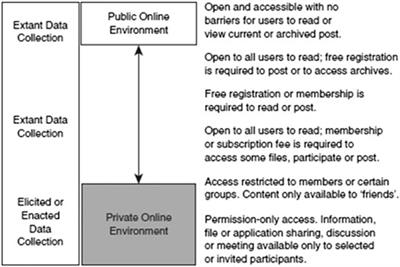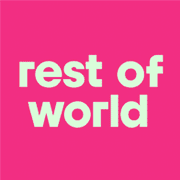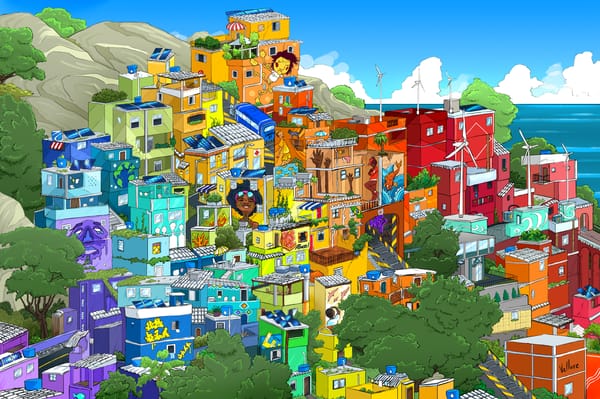Chat is minimum-viable anything
Chat is the minimum-viable tool for online organizing. Without complete control over our means of communication, our ability to organize depends entirely on the goodwill of the very same hegemonic incumbents which we seek to surpass.

Two or more people together in a group chat room; that's a minimum-viable community.
A few drivers together in a group chat; that's a minimum-viable ride-sharing platform.
One person together with an LLM in a chat interface; that's a minimum-viable AI assistant.
Chat is where big ideas are incubated


..many even build directly on chat
Drivers are using online communities on Facebook, WhatsApp, or Zello to create their own “platforms” and compensate for low earnings in the multinational companies. In many cases these drivers even abandon the multinational platforms such as Uber to work fully in their own structures.

WhatsApp has become an all-in-one business management tool. For the La Palmita, check-ins and check-outs are confirmed via the application, while maintenance and front desk staff are managed through the group function. It’s also used heavily externally, in getting quotes from service providers for linen, replacement parts and tools, as well as negotiating contracts that are sent, returned and signed, all via the [chat] platform.



All kinds of ventures started as nothing more than a group chat. It’s how you throw kindling on the initial spark of an idea: a test of resonance ❤️🔥
Becoming a network to fight the network
While WhatsApp dominates* personal messaging - and their moat is unassailable until regulation dismantles their Free Basics scheme - geeky netizens like us are either on Slack or Discord. The latter is particularly popular among open source projects that operate in public view by default.
(*it‘s not untouchable. Our friends at Acter seem to have a compelling way in by focusing on organizing 🙌)
Makers on the internet deserve a minimum-viable anything platform that respects their privacy and agency. Open alternatives do already exist, but they're nowhere close to the prevalence of Discord, mainly due to one "simple" feature: Networking effects.
Mattermost, Rocket.Chat, Discourse, Zulip, Linen; These are all great open source alternatives to Discord as a group messenger. But Discord is the superior community platform by being the one thing these other alternatives are not: A network.
As the ongoing mass-migrations from Twitter to Mastodon and Reddit to Lemmy have shown, internet users have become better informed about the dangers of centralization and networking effects. When the incumbent platforms fully enshittified, defectors didn't flock to just any other app for an easy fix. Instead of continuing the vicious cycle of identity lock-in and data harvesting, we sought out the open networks.
When Discord inevitably implodes, there's only one clear contender for migrants in search of an open messaging network: Matrix, “an open network for secure, decentralised communication”.

Networking effects combined with monopolistic practices are increasingly recognized as anti-competitive, which has brought us the European Union's DSA & DMA. Similar legislation is brewing in the USA. There is a confluence of both a cultural and political shift happening.
The Matrix org has been both campaigning and preparing for this sea-change since their founding, and by now they've amassed an open and interoperable network of 100 million user accounts and 3 million 4.5 million monthly active users (last report from FOSDEM 2024).
This growth is likely to accelerate further with Matrix' early adoption and active participation in the emerging MIMI interoperability standard, which incidentally is leading to a simplified Matrix API surface tentatively known as Linearized Matrix.
We believe the best thing for an open internet is to build on top of this network rather than trying to compete as Yet Another Protocol vying for widespread user adoption. Innovation by coordination more so than superficial novelties.
Seize the means of communication
The internet activist Cory Doctorow has inspired a lot of the work we do at Commune. His latest book explains how we got ourselves into the mess we're in, and then points toward how we can get out of it.
The Internet Con: How to Seize the Means of Computation
Abridged versions are available in the medium of your choice:
- Article: https://spectrum.ieee.org/doctorow-interoperability
- Podcast: https://truthout.org/audio/to-fight-big-tech-we-must-seize-the-means-of-computation/
- Video: https://youtu.be/rimtaSgGz_4
It really comes down to this:
If you’ve never tried to organize a movement without the internet, I’m here to tell you, it’s really hard. We need to seize the means of computation, because while the internet isn’t the most important thing that we have to worry about right now, all the things that are more important, gender and racial justice, inequality, the climate emergency, those are struggles that we’re going to win or lose by organizing on the internet.
Chat is the minimum-viable tool for online organizing. Without complete control over our means of communication, our ability to organize depends entirely on the goodwill of the very same hegemonic incumbents which we aim to negate. They're fine with our rebellious streak so long as it's ineffective, but once it starts actually working their benevolent nature will fade away as if it was never there, just like their long gone ambition to not be evil.

In the next few weeks, we'll tell you all about Commune's past, present and future as a comms platform designed for personal and communal liberation:
- What is Commune? – A client, a backend, an app and a hub.
- Beyond Discord – Keeping the good parts.
- Federated Webrings – A user-centric approach to federation.
- Message Gardening – Facilitating wisdom of the crowd
- Incremental Everything – Baby-steps UX paradigms









